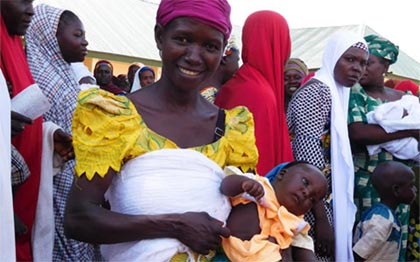In Nigeria, people are afraid of HIV and of each other. The stigma attached to HIV infection discourages people from being tested and makes it very difficult for partners to disclose their status others. This creates a dangerous situation for pregnant women and their unborn children because the stigma around HIV prevents them from accessing HIV prevention and treatment services.
The Rural Health Project in northeast Nigeria is making a difference in increasing access to care. Through a grant from the United Methodist Global AIDS Fund (UMGAF), attendance at prenatal care has increased 80 percent. Through fixed and mobile clinics, which are open to all pregnant women, many are being tested for HIV and learning about prevention. The grant to the Rural Health Project was made possible by donations to UMGAF through The Advance.
The project leader described a consultation:
One of our clients was counseled and tested positive. She phoned her husband from the counseling room and told him the result. He was shocked, spoke with the counselor, and promised to come the next day. He did. He also tested HIV positive; they were counseled as HIV concordant partners, and referred for treatment. They said, "We would still have been in darkness if our pastor had not announced that there would be an outreach offering PNC [prenatal care] services. We wouldn't have found out our status because clinics around us don't offer HIV counseling and testing."
 |
| During a net distribution in October at a maternal and child health clinic in Nigeria, mothers and expectant mothers receive pre -and postnatal care. Photo: Kathy Griffith. |
The Rural Health Project has trained 45 religious and community leaders in HIV education and advocacy, who have also pledged their ongoing support of the Prevention of Mother-to-Child Transmission (PMTCT) program. In one area, a group of women have begun to visit the homes of ill villagers who are commonly believed to have been bewitched. They help families see their need for HIV testing, and strongly encourage them to take action.
In addition, six nursing staff and 12 traditional birth attendants were trained to work in PMTCT outreach. As a result, 2,700 pregnant women received HIV counseling and testing in the first six months of the project. Those who tested HIV-positive were referred to the closest hospital for treatment and follow-up care.
According to UNICEF, 260,000 children were newly infected with HIV worldwide in 2012. This equals about 713 children a day. But, women with HIV, who take antiretroviral (ARV) medication during pregnancy, can reduce the risk of transmitting the virus to their babies to less than 1 percent. The transmission rate of HIV from a positive mother to her child during pregnancy, labor, delivery or breastfeeding, without intervention, ranges from 15–45 percent.
Since this particular initiative began in 2014, UMGAF has funded 17 projects in 13 countries reaching more than 66,000 beneficiaries. Contributions to UMGAF support many similar ventures, in addition to AIDS initiatives in the United States through the respective annual conferences of The United Methodist Church.
Kathy Griffith, Grants Officer for Maternal and Child Health.
The Advance is the accountable, designated-giving arm of The United Methodist Church. The Advance invites contributors to designate support for projects related to the General Board of Global Ministries. Individuals, local churches, organizations, districts and annual conferences may donate to The Advance. One hundred percent of every gift to The Advance goes to the project selected by the giver.





